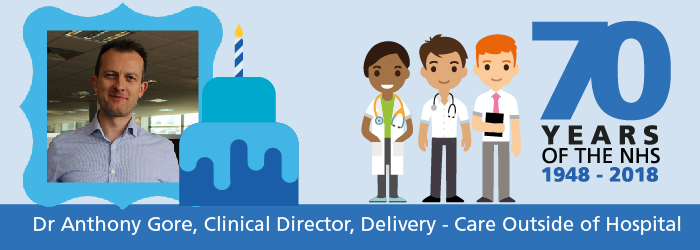
NHS70 Primary Care Focus

Dr Anthony Gore is the clinical lead for Delivery – Care Outside of Hospital. He qualified in 2000 and has been a partner at Woodseats Medical Centre for 16 years. His work spans a very broad portfolio of work, which includes neighbourhood development, work with active support and recovery, and community services, along with being a lead on end of life care and cancer.
“General Practice was already making a huge move towards prevention when I started seeing patients in 1996. My more senior partners who had started in the early 70s had experienced a system that had a relatively small number of drugs that helped a relatively small number of known conditions: this was a very ‘reactive’ service, helping people as they came through the door with a problem.
“The more we know about health and conditions, the more proactive we’ve become; we take people for screenings and prescribe preventative drugs (that can manage things like blood pressure and cholesterol) a lot earlier now, meaning the number of people who have, for instance, cancer, heart attacks and strokes, is now much lower.
“Hopefully we’re able to prevent these life-threatening conditions, and as a result, people are living longer. Even if something isn’t curable, there are very often other things we can do to make sure people live for as long as possible For example, I see a lot of people who have certain cancers that either with hormone manipulation or with some of these new drugs, are living a long time just by taking an oral pill every day.
“This is an amazing difference, but it does mean that a lot of people can be managing a number of conditions over their lifetime. Our patients now have a long history of different illnesses, and all of these things need to be considered. These complex pictures have grown: it’s a bigger challenge for us in our roles, but it’s great to know that our work helping prevent and manage illnesses is making an impact.
“Care isn’t one-size-fits-all anymore, and to make sure we cater for these complex histories we need to take a more person-centred approach. Whilst one person might need a lot of support, many of our patients are capable of keeping themselves healthy, and might not need to visit the practice as regularly. It’s all about looking at the individual, their whole medical history, and their confidence in looking after themselves. This is a huge change that we’re moving towards at the moment.
“Helping people manage these long term conditions better has also transformed the workforce in a GP practice. Nursing teams have grown, and we have healthcare assistants now which we didn’t have when I started: these teams are supported by GPs, but there’s loads of support they can give without needing us to get involved. Back when a doctor’s surgery was in a converted house or corner shop, you might have been used to seeing the same GP each time, but now you might be seen by another health care professional such as a nurse practitioner, practice nurse or healthcare assistant. If you’re signposted and receive the right care by the right person first time, it’s much better for everyone involved. The important thing is that patients receive continuity if they need to make multiple trips back to their practice over a short period.
“Another way you can make general practice more resilient to help with these complex needs is by sharing resources. Neighbourhood working is the next step in this direction: practices working together in Neighbourhoods across the city means you can share staff, find new ways of doing things together and ensure that you’re all working consistently. The other benefit of working as a neighbourhood is that we can branch out to work more closely with community nursing, social workers, health visitors, and community groups in what we call ‘social prescribing. This means we’re starting to offer more to patients with long term conditions, linking them into things like weight loss groups, social groups and support with things like giving up smoking. All of these services in the community can have such a positive impact on people.
“By working together and offering a more personalised approach, we’re making sure that the people of Sheffield are not only living longer lives but healthier ones, too – the more we can do to increase that quality of care, the better.”


 Translate this page
Translate this page